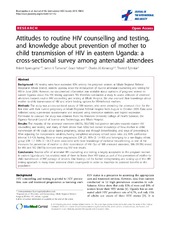Attitudes to routine HIV counselling and testing, and knowledge about prevention of mother to child transmission of HIV in eastern Uganda: a cross-sectional survey among antenatal attendees
Peer reviewed, Journal article
Published version

Permanent lenke
https://hdl.handle.net/1956/4633Utgivelsesdato
2010-12-13Metadata
Vis full innførselSamlinger
Originalversjon
https://doi.org/10.1186/1758-2652-13-52Sammendrag
Background HIV testing rates have exceeded 90% among the pregnant women at Mbale Regional Referral Hospital in Mbale District, eastern Uganda, since the introduction of routine antenatal counselling and testing for HIV in June 2006. However, no documented information was available about opinions of pregnant women in eastern Uganda about this HIV testing approach. We therefore conducted a study to assess attitudes of antenatal attendees towards routine HIV counselling and testing at Mbale Hospital. We also assessed their knowledge about mother to child transmission of HIV and infant feeding options for HIV-infected mothers. Methods The study was a cross-sectional survey of 388 women, who were attending the antenatal clinic for the first time with their current pregnancy at Mbale Regional Referral Hospital from August to October 2009. Data were collected using a pre-tested questionnaire and analysed using descriptive statistics and logistic regression. Permission to conduct the study was obtained from the Makerere University College of Health Sciences, the Uganda National Council of Science and Technology, and Mbale Hospital. Results The majority of the antenatal attendees (98.5%, 382/388) had positive attitudes towards routine HIV counselling and testing, and many of them (more than 60%) had correct knowledge of how mother to child transmission of HIV could occur during pregnancy, labour and through breastfeeding, and ways of preventing it. After adjusting for independent variables, having completed secondary school (odds ratio: 2.5, 95% confidence interval: 1.3-4.9), having three or more pregnancies (OR: 2.5, 95% CI: 1.4-4.5) and belonging to a non-Bagisu ethnic group (OR: 1.7, 95% CI: 1.0-2.7) were associated with more knowledge of exclusive breastfeeding as one of the measures for prevention of mother to child transmission of HIV. Out of 388 antenatal attendees, 386 (99.5%) tested for HIV and 382 (98.5%) received same-day HIV test results. Conclusions Routine offer of antenatal HIV counselling and testing is largely acceptable to the pregnant women in eastern Uganda and has enabled most of them to know their HIV status as part of the prevention of mother to child transmission of HIV package of services. Our findings call for further strengthening and scaling up of this HIV testing approach in many more antenatal clinics countrywide in order to maximize its potential benefits to the population.
Opphavsrett
Byamugisha et al.Copyright 2010 Byamugisha et al; licensee BioMed Central Ltd.
